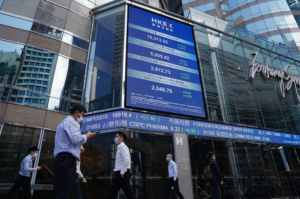Since the onset of the COVID pandemic, tech companies and electronics suppliers in Southeast Asia have seen a significant increase in market value, while traditional corporations in the region have declined. According to a Nikkei study, around 3,700 nonfinancial companies listed on Southeast Asian stock exchanges had a combined market capitalization of $1.63 trillion as of July, marking a 12% rise from the end of 2019 and a 27% gain from the end of 2013.
These companies are primarily located in the main Southeast Asian economies of Thailand, Indonesia, the Philippines, Singapore, Malaysia, and Vietnam.
Delta Electronics (Thailand), a subsidiary of the Taiwanese group Delta Electronics, particularly stands out, with its market capitalization growing by a factor of 18 since the end of 2019 to reach $41.1 billion. This places it second among the Southeast Asian companies studied, a significant improvement from its 134th position in 2019. The company’s success can be attributed to its shift of electronics component manufacturing from China to Southeast Asia in response to U.S.-China tensions, as well as the anticipated demand from the electric vehicle industry.
The Stock Exchange of Thailand has cautioned investors about speculative trading in Delta’s stock due to unusual price movements. However, an analyst at Yuanta Securities in Thailand, Supachai Wattanavitheskul, believes that Delta has sustainable growth potential, especially considering its long-standing investments in India and the benefits it can derive from the U.S.-China trade rivalry.
Singapore’s gaming and e-commerce giant, Sea, secured the third spot in Nikkei’s ranking, rising from 20th place in 2019. Sea’s success can be attributed to its ability to capture the increased demand during the pandemic through its main platform, Shopee. While Sea experienced sales growth leveling off as economies reopened and implemented significant staff cuts to achieve profitability, its market capitalization almost tripled, reaching $34.6 billion from the end of 2019.
In contrast, market values for Southeast Asia’s major conglomerates and state-owned companies have shown lackluster performance. For example, PTT, Thailand’s government-controlled energy major, which led all Southeast Asian companies at the end of 2019, has fallen to sixth place. PTT’s market value declined by over 30% during this period, reaching $29.2 billion.
In the first half of 2023, PTT, a major energy company, reported a 39% year-on-year drop in Earnings Before Interest, Taxes, Depreciation, and Amortization (EBITDA), totaling 196.6 billion baht ($5.32 billion). This decline was attributed to increased costs related to accessing liquefied natural gas supplies.
CP All, the key retail unit of CP Group, slipped from the eighth position in 2019 to the 15th place in the current rankings, as its market capitalization decreased by 23% to $16.6 billion. Investors are concerned about CP All’s slow expansion into neighboring countries, as it heavily depends on Thailand.
Investors are also paying more attention to decarbonization and digitization efforts among Southeast Asian companies. Many large firms are perceived as making insufficient progress in transitioning towards carbon reduction and digital transformation, according to Koji Hamasaki, a partner at KPMG FAS with expertise in Southeast Asian companies.
For instance, PTT’s collaboration with Taiwan’s Foxconn to manufacture electric vehicles is still in its early stages, and the expected benefits have not yet reflected in the stock market.
Some companies in the region have less straightforward valuations. The top-ranked company in Nikkei’s list, Bayan Resources, is an Indonesian coal producer with a market capitalization of $43.8 billion. Its net profit increased significantly, primarily due to the rising price of coal following Russia’s invasion of Ukraine. However, concerns about speculative price movements persist due to its low international recognition.
In Singapore, Singtel, a telecommunications provider, maintained its fourth position with a market capitalization of $33 billion. Singapore Airlines also climbed to the 14th place from the 74th with a market cap of $16.8 billion, thanks to a record net profit of 2.16 billion Singapore dollars ($1.57 billion) for the year ending in March.
In Vietnam, state-owned PetroVietnam Gas rose to the 35th position from the 43rd in 2019, with a market cap of $8.2 billion. It reported a higher net profit in the first half of 2023 compared to the same period in 2019.
On the other hand, Philippine companies have generally faced challenges. SM Investments, which operates in retail and real estate, has seen its stock value depressed, largely due to the Philippine stock market’s failure to reach 2019 levels. Economic concerns related to China and Western countries are also contributing factors.
Overall, Southeast Asian companies are influenced by their exposure to the Chinese economy, which can impact their performance, especially in terms of external demand, according to Toru Nishihama, chief economist at the Dai-ichi Life Research Institute.
(Source: Kenya Akama | Fumiko Sato | Yuji Nitta | Yuichi Shiga | Nikkei Asia)









